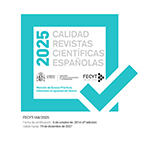La digitalización como oportunidad para el desarrollo de la ciudadanía en la infancia y la adolescencia
Resumen
En el marco de la ausencia de un estatus formal de ciudadanía para niños, niñas y adolescentes, el desarrollo de la ciudadanía digital podría ser una oportunidad para promover su participación y su protagonismo, al facilitarles nuevos espacios y medios para expresar y compartir sus opiniones, superando los marcos referenciales del ámbito familiar y escolar. El objetivo de este artículo es analizar los límites establecidos para el logro de la ciudadanía digital activa en la infancia y la adolescencia en el entorno escolar.
Para este fin se ha analizado el marco normativo y se han recogido 59 testimonios de niños, niñas y adolescentes, padres y madres, expertos y personal docente. El análisis de contenido etnográfico revela que el acceso a los medios digitales queda limitado por la tutela y asimetría de poder con el adulto, además de por la ausencia de reconocimiento de derechos políticos y civiles en la infancia y adolescencia. Esto estaría obstaculizando el avance en el desarrollo de la ciudadanía digital en la infancia y la adolescencia en el marco de la sociedad de la información.
Descargas
Descarga artículo
Licencia
La revista Política y Sociedad, para fomentar el intercambio global del conocimiento, facilita el acceso sin restricciones a sus contenidos desde el momento de su publicación en la presente edición electrónica, y por eso es una revista de acceso abierto. Los originales publicados en esta revista son propiedad de la Universidad Complutense de Madrid y es obligatorio citar su procedencia en cualquier reproducción total o parcial. Todos los contenidos se distribuyen bajo una licencia de uso y distribución Creative Commons Reconocimiento 4.0 (CC BY 4.0). Esta circunstancia ha de hacerse constar expresamente de esta forma cuando sea necesario. Puede consultar la versión informativa y el texto legal de la licencia.











